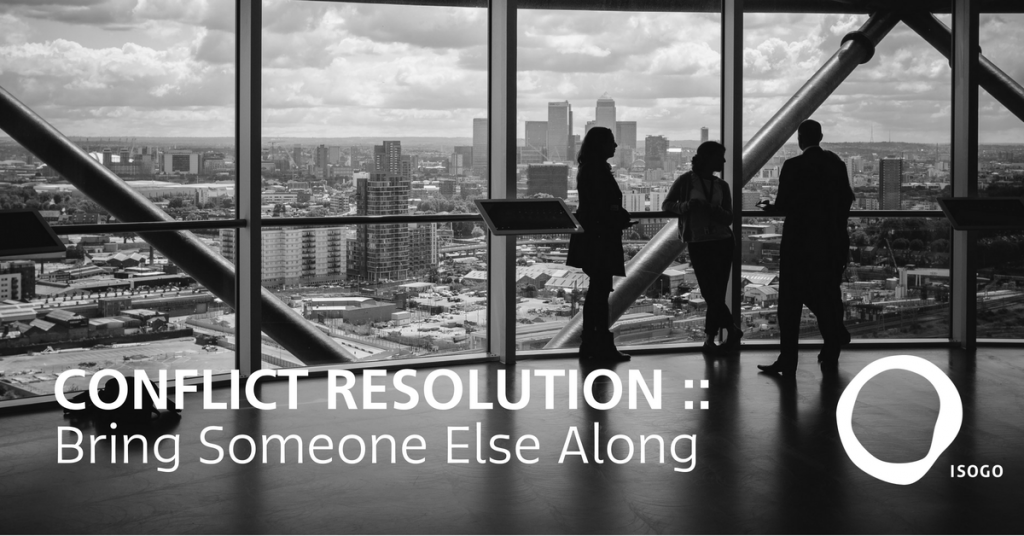What if your conflict is still not resolved? Perhaps it’s time to bring someone else in on the conversation.
When my mom was dying, my husband was deployed, and I was about to give birth to our third baby, I sought out a counselor. Perhaps out of fear of stigma, I waited too long—until life felt out of control—but it was one of the best decisions I ever made.
There are moments from our time together that I reach back to to this day.
Externally, two of my key takeaways are this:
1 :: I will say things in front of a neutral third party that I would never say without her, and similarly, I will not say things in front of a neutral third party that might otherwise just spill out without her presence.
2 :: The outside perspective is unmatched. Inside my own story and my own storm, I can lose sight of the big picture and lose a grasp on the truth.
Next Step When the Conflict Does Not Resolve
If you have been following along with our Conflict Management series, you have a framework for addressing your emotional templates, you understand the influence of your own perception frustration, you inspected the state of your own heart and contribution, and you perhaps even began a one-on-one conversation with the person who you have experienced conflict with, framed around their Strengths.
But…what if the conflict persists?
The next step is both simple and challenging. Much like seeing a counselor.
For the very same reasons we bring counselors into marriage conflict and mediators into business conflict, it is time to bring someone else into the conflict conversation.
Four Reasons to Bring Someone Else Along
You have met privately, yet the conflict is not resolved. You are still unsettled, and you have not reached a mutual understanding. Perhaps emotions and hurt are still hot.
There are four key reasons to bring someone else into the conversation at this point.
1 :: The things you DO say.
Depending on the make-up of your Talents and Strengths, there may be things you hold back from saying or doing when you are one-on-one in a conflict conversation.
Perhaps you hold back the true hurt you experience. Perhaps you are concerned about damaging the relationship—one that you care about for emotional or strategic reasons. Or perhaps, you have tried to speak, only to be met with a strong reaction that did not allow you to be heard.
When you invite someone else into the conversation, you invite questions that draw out the insecurities or sensitivities that have not surfaced until that point.
You invite safety to bring out the unmentioned, unaddressed or unheard.
2 :: The things you DON’T say.
This one is huge. When there is someone else in the room, we use filters on our words and even on our emotions, that we don’t use when we are alone.
Think about the last heated argument you had with your spouse or other family member. When we are alone together in the conflict, words fly and emotions soar.
But, what happens when someone else walks into the room? For most of us, immediately our tone, volume, and language changes. The voices hush and the accusations dissipate.
This very thing happens, to an even greater extent, when you plan for someone else to come along into your conflict conversation.
Where there may have been accusation, there are now questions. Where there may have been harsh words, there is now discussion. And the amplified energy of the entire process returns to a low hum.
3 :: The insight you get.
Once we are entrenched into the details, the hurt, and the story of the conflict, it is difficult, if not impossible, to see with entirely clear judgement. {Even if you have done all the pre-work!}
A trusted, neutral third party provides an outside perspective that neither one of you have, and that insight of someone else can pave a path forward that breaks through the walls you have erected.
They see what the two of you could not see on your own.
4 :: The accountability you invite.
Inviting someone else into the conflict conversation creates an immediate sense of accountability. Not only are you accountable to what you do and don’t say {see 1 and 2!}, but you also become accountable for your behavior following the discussion or resolution.
The third party has heard your contention, and they have heard your agreement. He/she knows the details of the resolution, and will expect that you uphold your ongoing behavior to support the resolution.
Who and How to Bring Someone Else Into the Conversation
As a quick concluding note, exactly WHO you bring into the conversation and HOW you bring them in is incredibly crucial.
Who to Bring In
In order to realize the benefits of bringing someone else along, the person you invite must be neutral—to both of you. If either of you feel like the third party holds bias, the conversation will not be effective.
How to Bring In
Bringing someone else into the conversation is not an ambush, and it is not a surprise attack. It must be mutually agreed upon and scheduled together. Your third party will be completely ineffective if the other person does not expect or buy in to his/her presence.
By the time you have come to the point of bringing someone else into the conversation, the conflict is elevated, maybe even heated. Adding a neutral third party is not a silver bullet, but it does open the door to the possibility that your relationship could be restored and your conflict resolved, and that makes it a worthy step on the path to resolution.
LINKS | RESOURCES | CONNECT
Links & Resources from today
Also catch the Conflict Resolution series on Audio + Video, on the Isogo TV Podcast, Episodes 62-67 {with added resources}!
Discover your Top 5 Strengths with StrengthsFinder + Strengths Startup
Bring It | Need IT {FREE Resource}
Get your own Dare to Dialogue Conversation Card Deck
Live Life to the Fullest by Using Your Strengths
Conflict Resolution :: You Are Ready for Respectful, Private Conversation
Conflict Resolution :: Inspect Your Own Heart First
Conflict Resolution :: Perception Frustration + What to Do About It
Conflict Resolution :: Influence of Emotional Templates
9 Steps to Life-change {FREE Checklist}
{9 Steps} to Life Change through your StrengthsFinder Top 5 Strengths
Connect
The Strengths-perspective can impact your marriage, your parenting, and your work!
If you’re into it or you’re just not so sure about it all, reach out, and let’s connect about it. You can catch me on Facebook, Twitter or Instagram, all at @isogostrong, by this handy contact form, or in our Energy Up Frustration Down facebook group.
Enjoy your day, and {be strong}!










